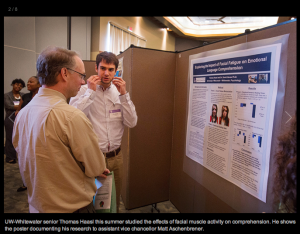The Lab for Language and Emotion had a strong presence at the fall 2013 Undergraduate Research Day, held on the UW-Whitewater campus. In all, there were three poster presentations by students associated with the lab, including Thomas Haasl (pictured), Nick Walker, and Mindy Thao.
Monthly Archives: November 2013
Meet lab member Nicholas Walker
Lab member Nicholas Walker is a McNair Scholar. Nick is investigating neural mechanisms that may influence the fundamental attribution error.
From the abstract of Nick’s project, entitled “Reducing the Fundamental Attribution Error by Manipulating the Mirror Neuron System“:
“The Fundamental attribution error (FAE), or the tendency to overestimate dispositional factors and underestimate situational factors while explaining another`s behavior, has been shown to be reduced through training in cognitive empathy. I am interested in the mechanism that is accountable for empathy and how manipulating this mechanism may help in the reduction of the FAE. The mirror neuron system (MNS) has been proposed as a mechanism for empathy. The MNS is a brain network in humans that has been shown to be active both during the performance and the observation of the same action, and during both the experience of emotion and the observation of emotion in others. Thus, the MNS may provide a neural mechanism for empathizing with others. Socially mirrored actions, which putatively engage the MNS of participants, are known to increase the empathic bond between participant dyads. I hypothesize that manipulation of the MNS through socially mirrored actions will increase cognitive empathy and cause a reduction of the FAE. Theorists have proposed that there are two types of empathy (cognitive and emotional), and previous research is equivocal about what type of empathy the MNS is most related to. The purposed study, will evaluate the influence of socially mirrored actions on both emotional and cognitive empathy. “
Lab member Mason Wehse wins an Undergraduate Research Program (URP) grant
Mason’s research project, entitled “Semantic satiation and the comprehension of emotional language,” tests competing theories of emotional language processing.
From Mason’s project abstract:
“Classical cognitive theory proposes that emotional language induces emotions in readers through activation of mediating emotion concepts, like “happy” or “sad” which in turn activate emotional feelings. In contrast, embodied theory proposes that understanding emotional language involves a mental simulation that uses the same neural systems required in literally executing the emotion-specific actions described in the language. For example, reading a happy sentence, such as, “You bound up the stairs to your lover’s apartment”, involves simulating the implied actions of approach, whereas the sad sentence “You open your email on your birthday to find no new emails” involves simulating actions of withdrawal. In this account, the language-emotion link is unmediated by emotion concepts, and can be made directly through simulation of action. In support of the latter theory, research has shown that fatiguing actions of approach or withdrawal slows down comprehension of happy or sad sentences, respectively (Mouilso, Glenberg, Havas, and Lindeman, 2007). But can linguistic actions similarly impact emotional language processing? One tool to test these competing theories is through the use of “semantic satiation,” whereby words that are repeated gradually lose their phenomenological meaning. One study showed that semantic satiation of explicit emotion words (e.g., “anger”) negatively impacts a person’s ability to perceive emotions (e.g., anger) in facial expressions (Lindquist, Barrett, Bliss-Moreau, & Russell, 2006). However, research has yet to show if semantic satiation can be used to fatigue the systems used in understanding emotional language, and whether the effect depends on satiating explicit emotion words vs. implied emotional action words, like “approach” and “withdraw”.
The present study seeks to explore if satiation of emotional words, either explicit (“happy”, “sad”, “angry”) or implicit (“approach”, “toward”, “avoid”, withdraw”) can impact emotional language processing. Studying how language impacts emotion and action systems furthers the understanding of the relationship between these systems. Knowledge of this relationship can have real world applications, such as in mental health counseling, in which semantic satiation could be used to desensitize language that clients find emotionally harmful.”
Undergraduate Research and Wisconsin’s future
The Wisconsin State Journal published an article in April of 2013 about undergraduate research as economic tool for the state. Students engaged in research in the Laboratory for Language and Emotion can be encouraged to see that their efforts will impact the future of Wisconsin in so many important ways.


